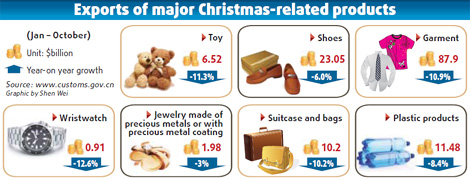Top Biz News
Holiday labor shortages
(China Daily/Agencies)
Updated: 2009-12-14 08:01

After a crisis that sparked mass layoffs in China's export hubs, factories in manufacturing heartlands such as the Pearl River Delta are on the hunt for migrant workers again as orders revive for Christmas.
In recent visits to three Pearl River Delta towns, a fragmented, but consistent picture of labor shortages has emerged, with big job recruitment centers such as CHTONE in Changan experiencing a surge in activity.
"We're seeing more of that now," said Zhang Mingming, a young manager at the job center where a large red banner over the main entrance advertised 400 new jobs at an electronics factory.
Only a few months ago, such factories were laying off employees by the thousands, and a mass reverse migration was taking place as millions of out-of-work men and women streamed back to their villages in rural China to wait for the economy to pick up.
Now, with factories in China's Pearl River Delta ratcheting up production to meet Christmas orders for everything from Barbie dolls to Plasma TVs and designer jeans, workers are in high demand in a region that produces about one-third of China's total exports.
Yet many of the millions of migrant workers who returned home have stayed there, unwilling to make a hurried return to the fickle job market in China's "world factory," as the Pearl River Delta is known.
"For every 10 people we look for, we can only find two or three," said Huang Zhilian, a manager at Vmart Electronics, a company that exports calculators, watches and DVD players to emerging markets such as Romania and Pakistan.
Slumped behind a recruitment booth at a job center in Shenzhen's Longgang town, Huang said he'd only managed to hire six people in the past three days.
"We come here every day now. There's no choice," Huang said.
Jobs have become more plentiful and better paid in China's interior, thanks to the central government's 4 trillion yuan stimulus package. The package included major spending in underdeveloped parts of the country to help the country's job market become less dependent on export hubs.
It's not just the Pearl River Delta that is scrambling to find workers.
Shortages elsewhere
Other industrial belts are also facing labor shortages such as Zhejiang, in the eastern Yangtze River Delta, where State media report there is a shortage of 250,000 workers.
|
||||
The demand for workers is putting upward pressure on wages, potentially eating into the already wafer-thin factory margins.
"Wages had come way down, and now they're starting to inch up again because a lot of the labor had migrated away," Rockowitz said.
While it remains to be seen whether China's migrant workers will stream back to the Delta, the recent labor strains underscore a growing need for the region to upgrade to reduce its reliance on low-end and labor-intensive industries.
While labor supply shortages aren't a new phenomenon, a demographic shift among China's 150 million migrant worker population suggests more are now content to stay home, rather than provide the muscle to power coastal export hubs.
"During the financial crisis many people returned home and once home, they don't want to come out again," said Lu Kewang, a young migrant worker from Guizhou province working at the Group Sense electronics factory in Dongguan's Changan town.













